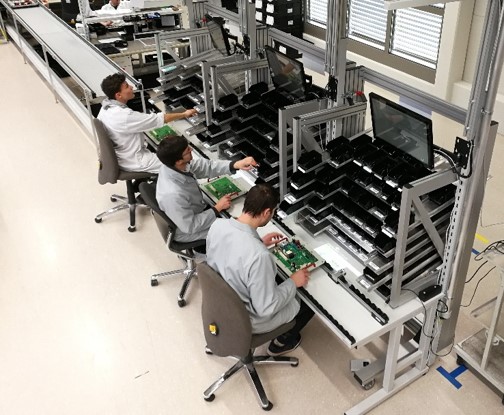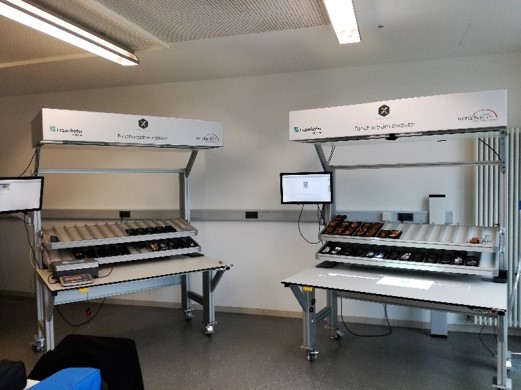References

Press
- Development of a marketable assistance system to support manual assembly processes (Bosch Rexroth-AG)
- Development of a networked, intelligent assembly line for the integration of workers with disabilities in industrial production processes (INTEG GmbH)
https://www.nw.de/lokal/kreis_hoexter/bad_driburg/22059381_Anspruchsvollere-Jobs-fuer-Menschen-mit-Behinderung.html - Development of the "SmartAssembly Trainer" for the training and further education of employees in production (Miele & Cie. KG)
https://www.mittelstand-nachrichten.de/netzwerke/fraunhofer-und-miele-entwickeln-den-smartassemblytrainer/ - Intelligent workstations for use in vocational training for people with physical and mental disabilities (wertkreis Gütersloh gGmbH)http://die-glocke.de/lokalnachrichten/kreisguetersloh/Interaktive-Hilfe-auf-der-Tischplatte-0c54c5ea-f45f-479e-8804-8bfd8994e4f1-ds
- Development of an intelligent set of tools for the human-friendly design of the digital working world while simultaneously increasing the efficiency of product creation (BMBF-IviPep) http://www.ivipep.de/
- Implementation of projection and data glasses-based workstations for an Industrie 4.0 plant (IAIT) https://www.lz.de/lippe/lemgo/22030587_OWL-Technologie-fuer-China.html
INTEG
Challenge
Not least because of the growing shortage of skilled workers in Germany, the employment of (severely) disabled people has become more of a focus in recent years. Overall, there is a need to exploit all potential in the long term in order to secure growth, prosperity and cohesion. However, to sustainably increase individual job satisfaction, people with disabilities must be enabled to earn their own living in a secure job - depending on their own abilities and interests. If employers actively shape occupational inclusion at this point, people with disabilities can potentially be fully capable employees, many of whom are particularly motivated to perform their tasks.
Benefit for the customer
- Continuous promotion of disabled and non-disabled employees is achieved
- 1/2/3 Individuals with different performance capabilities (different physical and mental limitations) and/or who are in the lower-performance learning phase up to the high-performance routine phase can be deployed individually.
- The homogeneous clocking of the plant is guaranteed and can react flexibly to the respective utilization situation
- Flexible adaptation allows further work steps to be integrated into the process
Profile of the customer
Company purpose: Integration company for disabled people
Employees: ca. 710
Sales: 21 Mio. EUR
Branch: EMS, Electronics Manufacturing, Electromechanics, CNC machining technology, cable assembly, insulation technology, packaging, logistics, GaLaBau
Location(s): Bad Driburg


Wertkreis
Challenge:
Against the background of an increasingly complex labor market and the associated consequences, the need arose to offer people with disabilities the possibility to keep up with this increasing complexity with the help of digital assistance. The focus of this project was the prototypical development of two intelligent assembly workstations to support people with disabilities with the help of gesture control and augmented reality. The workstations are to be used both for support in the productive area and in the training and further education of new employees.
Benefit for the customer:
- Reduction of training and changeover times, especially for orders with a high number of variants and small order volumes
- Improvement of the quality assurance of the products (among other things by integration of external control mechanisms)
- Supporting a high number of people with disabilities with content individually adapted to the qualification profile in each case
- Fast and uncomplicated introduction to work content, ideally up to qualification for the first labor market
- Configuration of the system and the content without external skills/programming effort


Life Help
Challenge:
Digitization will permanently change the industrial working world. In the sense of Work 4.0, however, this also offers the opportunity to address the individual needs of working people through the targeted use of technology. The topic of inclusion plays a particularly important role here. The aim of this transfer project is therefore the targeted transfer of know-how from the sustainability measure Work 4.0 to support people with disabilities to work independently in the production environment. To this end, a mobile assistance system is to be used to identify necessary work steps, annotate them individually and teach them to employees in a user-friendly manner. Through more demanding tasks and greater personal responsibility in daily work, we anticipate higher work quality and satisfaction.
Benefit for the customer:
- Digitization of work instructions offers the possibility of unlimited repeatability and retrievability
- The use of photos and videos offers the advantage of presenting work steps as realistically as possible
- Mastery of electronic support systems represents a key qualification for the general labor market
- For the disabled employees, the possible range of work expands. For weaker employees, too, access to new machines possibly opens up
Customer statement:
„Our collaboration with Lebenshilfe showed that assistance systems open up new possibilities in the field of inclusion."
- Bernd Stranghöner (techn. management)
Project volume:
92.265 €

 Industrial Automation branch INA
Industrial Automation branch INA